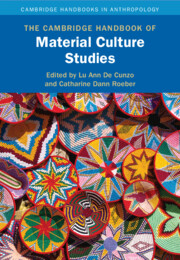Book contents
- The Cambridge Handbook of Material Culture Studies
- Cambridge Handbooks in Anthropology
- The Cambridge Handbook of Material Culture Studies
- Copyright page
- Dedication
- Contents
- Figures
- Tables
- Case Studies
- Contributors
- Acknowledgments
- 1 Suitcases, Selfies, and the Global Environment
- Part I Scholarly Genealogies
- Part II Relevant Pasts
- 4 Disciplinary Complicity: The University, Material Culture Studies, and Global Environmental Crisis
- 5 Social Justice
- 6 Engagement and the Politics of Authority
- 7 War and Violence
- 8 Material Culture and Heritage
- 9 Material Culture and the Politics and Profession of Preservation and Representation
- 10 Reenacting the Past
- 11 Indigenous Heritage
- Part III Engaging Across Cultures and Around the Globe
- Part IV Cultural Production and Reproduction
- Part V Experience
- Part VI Materiality and the Digital World
- Bibliography
- Index
5 - Social Justice
Material Culture as a Driver of Inequality
from Part II - Relevant Pasts
Published online by Cambridge University Press: 02 June 2022
- The Cambridge Handbook of Material Culture Studies
- Cambridge Handbooks in Anthropology
- The Cambridge Handbook of Material Culture Studies
- Copyright page
- Dedication
- Contents
- Figures
- Tables
- Case Studies
- Contributors
- Acknowledgments
- 1 Suitcases, Selfies, and the Global Environment
- Part I Scholarly Genealogies
- Part II Relevant Pasts
- 4 Disciplinary Complicity: The University, Material Culture Studies, and Global Environmental Crisis
- 5 Social Justice
- 6 Engagement and the Politics of Authority
- 7 War and Violence
- 8 Material Culture and Heritage
- 9 Material Culture and the Politics and Profession of Preservation and Representation
- 10 Reenacting the Past
- 11 Indigenous Heritage
- Part III Engaging Across Cultures and Around the Globe
- Part IV Cultural Production and Reproduction
- Part V Experience
- Part VI Materiality and the Digital World
- Bibliography
- Index
Summary
Increasingly scholars engage with the role of the material world in relation to social movements and the importance of the material world in limiting and expanding efforts for social justice. Regulation of space, use of objects to uphold or erode bias, and construction of objects as political tools are but some of the relationships outlined by scholars who position the material world as more than a backdrop to social change, but inherent to political and social actions.
Keywords
- Type
- Chapter
- Information
- The Cambridge Handbook of Material Culture Studies , pp. 100 - 127Publisher: Cambridge University PressPrint publication year: 2022
- 3
- Cited by

